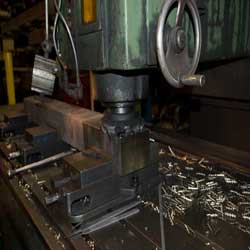
Here at Ecreative Internet Marketing, we work with a lot of different kinds of companies. I have clients that sell laptop cases and clients that are law firms. But our specialty is the industrial market, and while most elements of SEO remain applicable regardless of the industry or business type, there are many aspects that are specific to the B2B market, or even more specific to the industrial market. Everything from the kinds of people using the site (engineers and specifiers) to the SEO influence of the industry specific directories — the Thomasnet and IQS and MacRae’s directories.
But beyond those specifics, the thing that kills me about the industrial market is that I can never tell exactly what it is that a company does when I’m told what they do. I mean, when I’m told I’ll be working with a law firm, or a place that sells teddy bears or candy — I know what they’re all about, in general. But no so the industrial market. Even the names of the different industries within the industrial market are like some kind of secret code.
For example, when I was told that I would be working with a forging company the first thing that came to my mind was some kind of underground operation making copies of great works of art. I knew this couldn’t be right, so I asked, and I was told it was metal forging. “Ah,” I thought, “now I get it.” And of course in my mind I was picturing big muscular guys pounding out swords on an anvil, as any reasonable person would. But no, this was open die forging, some super common and well-known process of shaping and strengthening metal that involves neither anvils nor muscular guys nor even, sadly, swords. I was shown an open die forging video, which finally made it clear: it’s kinda like making lightsabers out of molten metal, for which they use big machines to shape the metal like molding playdough. It should really be called Molten Metal Squeezing, then people would understand.
Another example: metal stamping. This one seemed simple enough, they stamp metal to make designs in it, kinda like industrial bas relief or something. Oh no — this is deep drawn metal stamping, which is all about ferrules and presses and making shockingly complicated parts out of sheet metal in massive quantities — and it turns out that like almost everyone in the world, I use deep drawn parts every single day. Again, a video of the deep drawing process helped. Turns out it’s also like making things out of playdough, only they have a machine that punches it into shape a little bit at a time. Don’t ask me how they got the word “drawing” out of this — since clearly drawing involves a pencil and paper, and stamping is an entirely different process that involves cutting things out, not stretching them into different shapes. It should be called Machine Punching Metal Into Shapes.
Then we have security seals. At this point I had given up guessing, but little did I imagine this is about locking the doors of semi-trailers with bolt seals or cable seals or any of a billion other kinds of seals that all count as security seals. At the very least they didn’t have any similarities to playdough. I think these should be called One-Use Locks.
My point here is that the entire industrial market is cloaked in mystery like some kind of secret society that is obscure and unapprochable from the outside world. And working with clients across the industrial market is like going back to school every day to understand exactly how all these processes work, what makes them unique, what the selling point are and how they relate to each other. And then explaining all of that to Google.
One thing I have to say for the industrial market: at least it’s never dull. And I think we can both agree, you and I, that the industry would be immeasurably improved if I was put in charge of the names.






